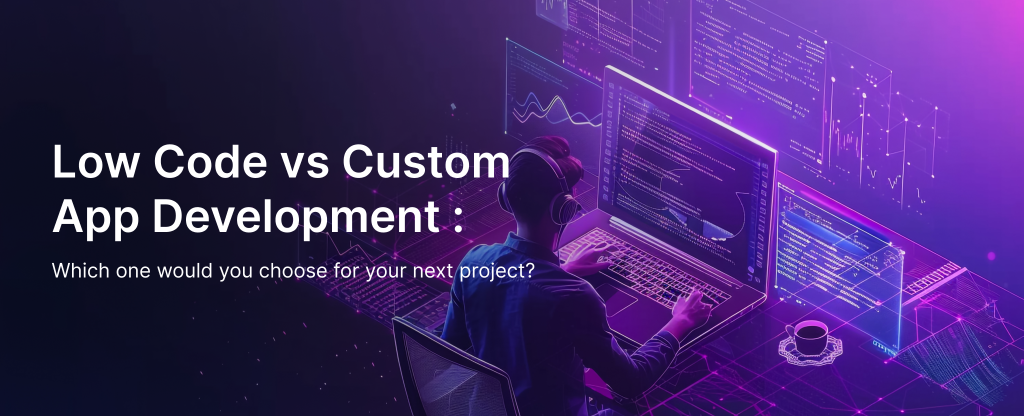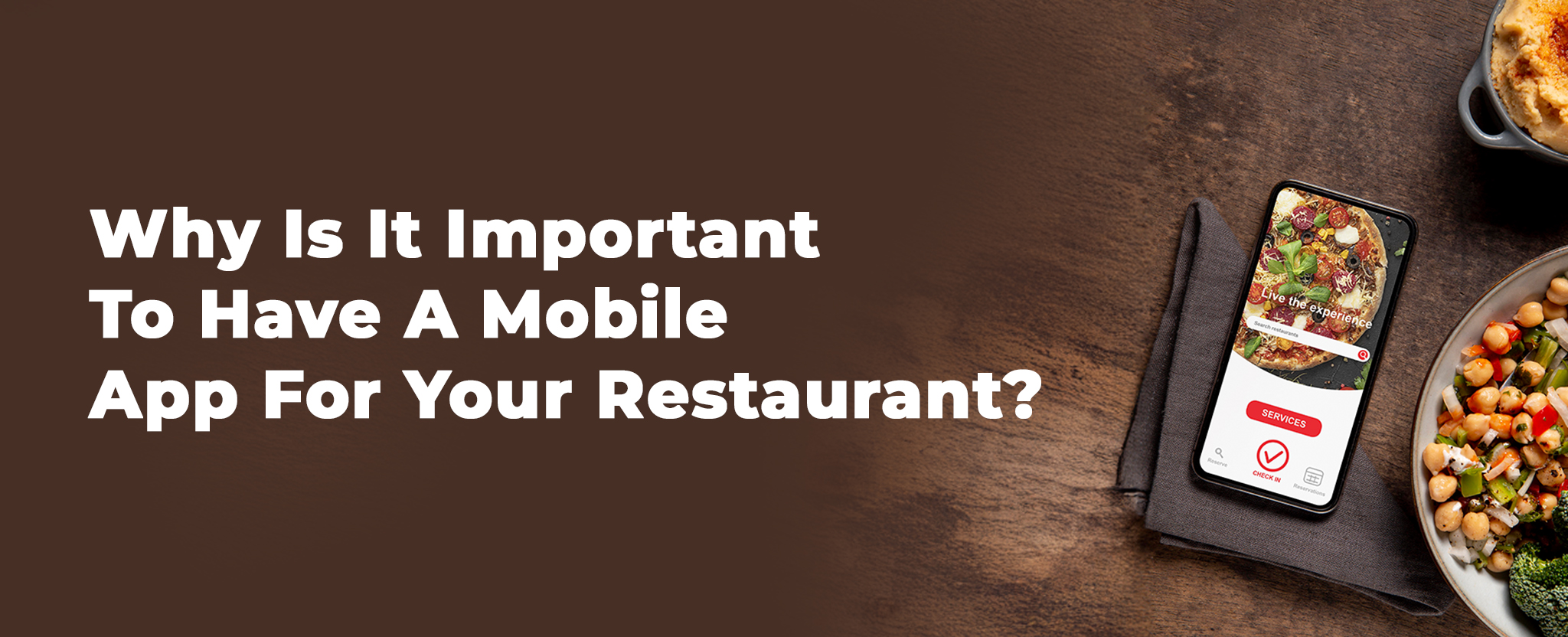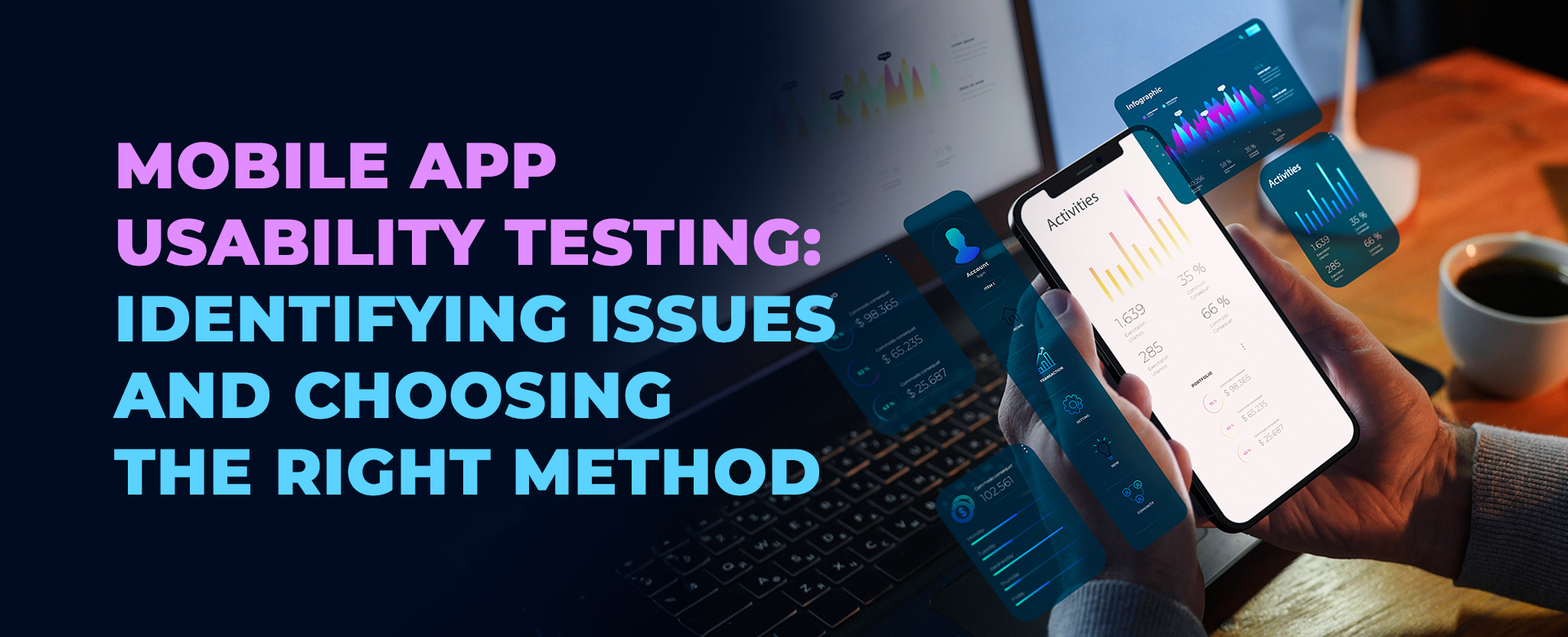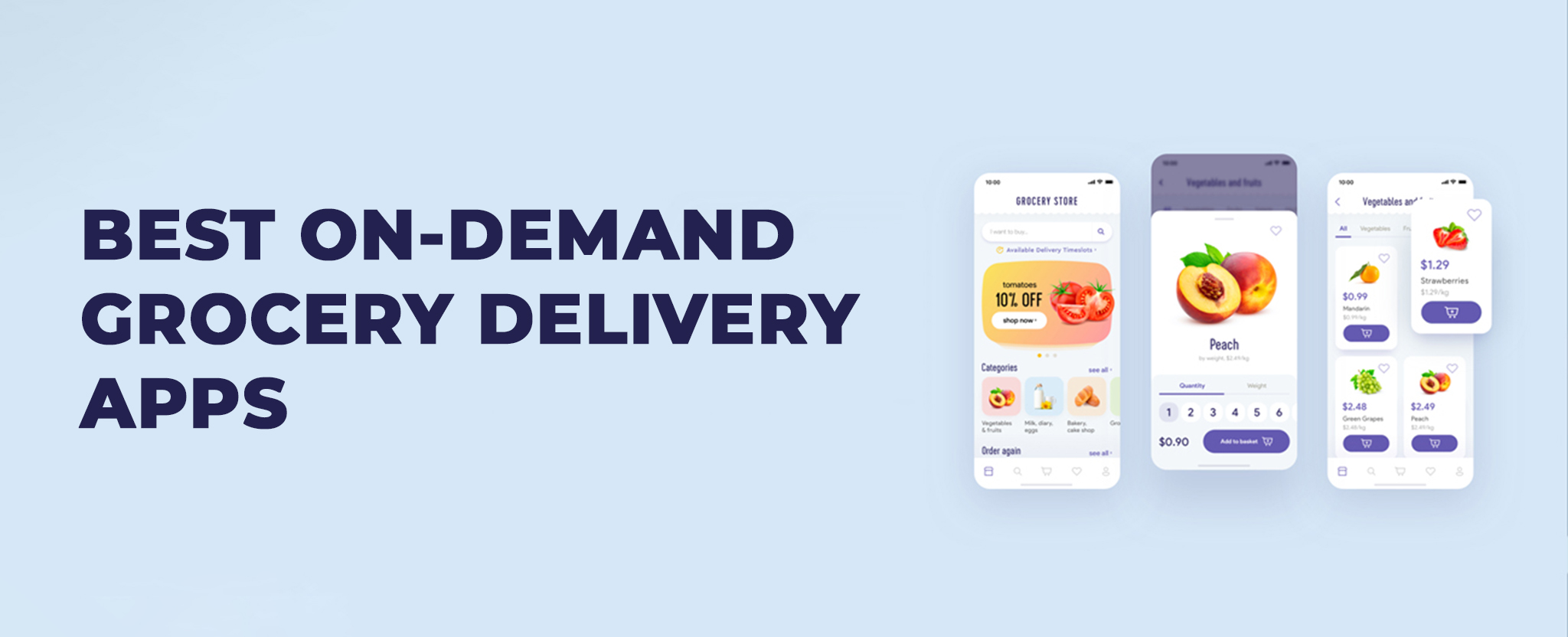Low Code vs Custom App Development : Which one would you choose for your next project?
25 Aug 24 


Did you know that by 2025, the global low-code development market is expected to reach $45.5 billion, while the custom app development market is projected to reach $40 billion? Or that 70% of enterprises are already using low-code platforms, while 80% of Fortune 500 companies rely on custom-built applications?
As the app development landscape continues to develop, the discussion over low-code versus custom app development becomes increasingly intense. On the one hand, low-code platforms promise faster development, lower costs, and greater agility. Custom app development, on the other hand, provides specialized solutions, unmatched flexibility, and scalable capabilities.
Low-code and custom app development have their own advantages and disadvantages. Low-code platforms have limited customization options, whereas custom app development can be time-consuming and costly. So, which one is best for your business?
Is it possible that the solution is somewhere in between? In this blog post, we will look at the advantages and disadvantages of both low-code and custom app development. We’ll look at the most recent trends, statistics, and success stories to provide you the knowledge and expertise you need to make an informed decision about your next app development project.
Key statistics
- 70% of enterprises use low-code platforms, reducing development time by up to 90%.
- The global low-code development market is expected to reach $45.5 billion by 2025.
- 80% of Fortune 500 companies rely on custom-built applications, which can increase productivity by up to 50%.
- The average cost of developing a mobile app is around $270,000.
- Despite the investment, 75% of apps are abandoned after the first use.
- Companies are taking notice, with 55% planning to increase their app development budgets in the next year.
Understanding Low Code Development
What is Low Code Development?
Low code development is like using building blocks to create your app. Instead of writing all the code manually, you use visual tools and prebuilt components. It’s akin to using a drag and drop interface to design a website, but for mobile and web apps.
Key Features of Low Code Platforms:
- Visual Development: Build apps using graphical interfaces without extensive manual coding.
- PreBuilt Templates: Start with readymade templates and customize them to fit your needs.
- Integration Tools: Easily connect your app to various systems, databases, and services.
Popular Low Code Tools:
Tool | Features | Best For |
|---|---|---|
| OutSystems | Robust features, enterprise grade solutions | Large enterprises, complex |
| Appian | Strong process automation, user friendly | Business process management |
| Mendix | Broad range of tools, collaborative features | Both business and IT users |
Advantages of Low Code Development
Speed of Development: Low code platforms are designed for rapid development. According to Forrester, low code platforms can reduce development time by up to 70% compared to traditional methods, making them ideal for quick deployments.
Cost Effectiveness: Less manual coding translates to lower development costs. Forrester reports that low code can cut development costs by as much as 50%, providing a more budget friendly option.
Accessibility for Non Technical Users: These platforms are user friendly, enabling business users to participate in app development without needing extensive programming knowledge.
Limitations of Low Code Development
Customization Constraints: While low code platforms offer many features, they might fall short when it comes to highly specific customizations. If your custom mobile app requires unique features, low code might not be sufficient.
Scalability Issues: Scaling a low code app can be challenging. While suitable for smaller projects, these platforms may struggle with very large or complex applications.
Dependency on Platform Providers: You’re tied to the platform’s capabilities and limitations. If the provider changes its pricing or features, it can affect your app.
Exploring Custom Mobile App Development
What is Custom Mobile App Development?
Custom mobile app development is like designing a bespoke suit. It involves creating an app from scratch to meet your specific needs. This approach provides full control over the features, functionality, and overall design of your app.
Characteristics of Custom Built Applications:
Customized Design: Custom mobile apps are built to fit your exact requirements and specifications.
Full Control: You have complete control over the app’s development process, allowing for detailed customization.
Scalable and Flexible: Designed to adapt and grow with your business needs.
Typical Process of Custom App Development:
1. Discovery Phase: Understanding the app’s requirements and goals.
2. Design Phase: Creating wireframes and prototypes for the custom app.
3. Development Phase: Building the app based on the designs.
4. Testing Phase: Ensuring the app functions as expected and meets quality standards.
5. Deployment and Maintenance: Launching the app and providing ongoing support.
Tools and Technologies Commonly Used:
Programming Languages: JavaScript, Python, Java, C
Frameworks: React, Angular, Django, Spring
Databases: MySQL, PostgreSQL, MongoDB
Advantages of Custom Mobile App Development
Solutions for Specific Needs: Custom mobile apps are designed to meet your exact requirements, offering features and functionalities that perfectly align with your business needs.
Greater Flexibility and Control: You have full control over the development process, allowing for modifications and customizations as needed.
Enhanced Security Measures: Custom apps can be built with advanced security features tailored to your specific needs and compliance requirements.
Check out this related post:Benefits of Custom Mobile Application Development
Limitations of Custom Mobile App Development
Higher Initial Costs: Developing a custom mobile app is often more expensive upfront. According to Clutch, custom app development can range from $50,000 to $250,000, depending on complexity.
Longer Development Time Frames: Building a custom mobile app from scratch can take several months to over a year, depending on the project’s scope.
Requirement for Technical Expertise: Custom app development requires a skilled development team, which may be a barrier for some businesses.
Comparative Analysis: Low Code vs. Custom Mobile App Development
Cost Comparison
| Aspect | Low Code Development | Custom Mobile App Development |
| Initial Investment | Lower, typically subscription based | Higher, involves significant upfront costs |
| LongTerm Financial Implications | Lower ongoing costs, updates included | Potentially higher maintenance costs |
| Hidden Costs | Platform limitations may lead to additional costs | Unexpected expenses in development and maintenance |
Development Timeframe
Low Code Applications: Generally quicker to develop. A simple app can be built in a few weeks, making it ideal for rapid deployment.
Custom Mobile App Development: Takes longer, often several months to a year. The timeline depends on the app’s complexity and requirements.
Factors Influencing Development Speed:
- Project Scope: Larger projects take more time.
- Complexity: More complex features extend development time.
- Team Size: A larger development team can speed up the process but may increase costs.
Customization and Scalability
Low Code: Provides basic customization options but may face challenges with highly specific needs. Scalability can be limited depending on the platform.
Custom Mobile App Development: Offers extensive customization options and is highly scalable, suitable for large and complex applications.
Case Studies:
Low Code Success: A retail company used OutSystems to develop an internal inventory management system, reducing development time from six months to six weeks.
Custom Mobile App Development Success: A financial services firm created a custom mobile app tailored to its unique compliance requirements, resulting in a highly secure and efficient solution.
Custom mobile app development : Use Cases and Best Fits
Ideal Scenarios for Low Code Development
Quick Prototype or MVP Creation: Low code is perfect for developing a prototype or minimum viable product (MVP) quickly, allowing you to test ideas and gather feedback.
Internal Tools for Small to MidSized Teams: Great for creating internal tools that streamline processes for small to mid-sized teams.
Rapid Application Deployment: Ideal for businesses needing to deploy applications swiftly without extensive development time.
Ideal Scenarios for Custom Mobile App Development
Complex Business Processes Requiring Fine Tuning: Best for applications with complex, specialized requirements that cannot be met with off the shelf solutions.
Applications Needing High Security and Compliance: Suitable for industries with strict regulatory requirements, where advanced security features are crucial.
Long Term Strategic Solutions with Changing Needs: Ideal for projects that will evolve over time, requiring a highly adaptable and scalable solution.
Custom mobile app development : Choosing the Right Path for Your Business
Factors Influencing the Decision Making Process: Consider your budget, timeline, and the specific needs of your business when deciding between low code and custom mobile app development.
Framework for Evaluating Your Specific Needs: Assess the complexity of your project, your budget constraints, and the available expertise.
Importance of Considering Future Growth and Scalability: Think about how the app will need to evolve and scale over time. Custom app development often provides better scalability for long term growth.
Making the Right Decision: Practical Steps to Choose the right Custom App Development partner
Assessing Your Business Requirements
Identifying Core Business Needs: Start by defining what your app must achieve. What problems is it solving? What features are essential for your custom mobile app?
Evaluating Existing Infrastructure: Consider how the new app will integrate with your current systems.
Prioritizing Features and Functionalities: List and prioritize features based on importance and feasibility.
Engaging Stakeholders
Importance of Stakeholder Input: Include feedback from those who will use the app and decision makers to ensure the development aligns with business goals.
Strategies for Gathering Feedback: Use surveys, interviews, and workshops to collect diverse input from stakeholders.
Balancing Different Perspectives: Ensure that the final decision considers both technical and business perspectives, balancing different viewpoints.
Prototyping and Testing Approaches
Approaches to Prototyping: Create prototypes to visualize the app and gather early feedback. Both low code and custom app development can benefit from prototyping.
Testing Methodologies: Implement user testing and quality assurance processes to ensure the app meets user needs and performs well.
Iterating Based on Initial Findings: Use feedback to refine and improve the app before final deployment.
Conclusion
Choosing between low code and custom mobile app development is a significant decision with long lasting impacts on your project’s success. Low code platforms offer speed and cost savings, making them ideal for rapid deployments and simpler applications. On the other hand, custom mobile app development provides tailored solutions with extensive customization and scalability, though it comes with higher costs and longer timelines.
In the end, the right choice depends on your specific needs, budget, and long term goals. By understanding the strengths and limitations of each approach, you can make an informed decision that aligns with your business objectives.
So, what’s your next step? Assess your needs, gather feedback, and weigh your options carefully. Good luck with your app development journey, whether you choose low code or custom mobile app development!
Want to take your business to the next level with a powerful app?
Get in touch with us at Mindster.com and let’s make it happen
- Android Development3
- Artificial Intelligence27
- Classified App3
- Custom App Development2
- Digital Transformation11
- Doctor Appointment Booking App13
- Dropshipping1
- Ecommerce Apps38
- Education Apps2
- Fintech-Apps35
- Fitness App2
- Flutter3
- Flutter Apps19
- Food Delivery App5
- Grocery App Development1
- Grocery Apps3
- Health Care7
- IoT2
- Loyalty Programs9
- Matrimony Apps1
- Microsoft1
- Mobile App Maintenance2
- Mobile Apps120
- Product Engineering5
- Progressive Web Apps1
- Saas Application2
- Shopify7
- Software Development1
- Taxi Booking Apps7
- Truck Booking App5
- UI UX Design8
- Uncategorized4
- Web App Development1



















Comments